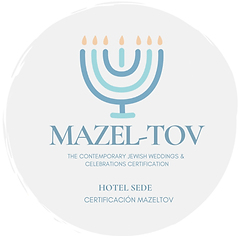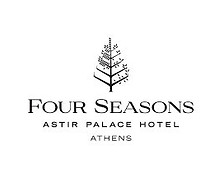top of page
Jewish Glossary
If you have any doubts about any word, don't hesitate to use
this glossary, which will always be there for you!
Ashkenazi
Aufruf
Badeken
Bar Mitzvah
Bat Mitzvah
Berajá | Brajá
Berberisca
Bircat Hamazon
Birconim
Ashkenazi Jews are a distinct subgroup of the Jewish diaspora, originating in the Holy Roman Empire and Central and Eastern Europe, with Yiddish as their traditional language and a significant cultural and historical presence in those regions.
Event in which the groom is invited to read the Torah. In Yiddish it means "called." Oyfruf.
Veil ceremony - Ashkenazi tradition
Celebration that is given to children when they turn 13 years old. From this moment on they will be considered responsible for their actions before G-d and their community.
Celebration given to girls, "daughter of the commandments (mitzvot)") who have reached personal maturity and before their community, has been set at 12 years for girls, although there is a transition period of six months and a day in which the woman is considered naara, "young woman", until she is called bogueret, "mature".
Blessing
Ceremony held by Sephardic communities prior to the wedding day. It is also known as Henna Night.
Blessings recited after eating bread at a meal.
Prayer book for a particular event. The most common Bircat Hamazon.
Brit Mila
Erusin
Eruv
Challah
Get
Guemará
Hagalá
Hanukkah / Janucá
Halajá
Hashgajá / Hechsher
Havdalá
Hanukkiah / Januquiá
Jalav Israel
Jalot
Jasidim /Jasídicos
Jatán
Jazán
Jupá / Chuppah
Kadosh
Kalá
Kabbalat Panim
Kedushá
Ketubá
Kiddushin
Kipá / Kipot
Kohen / Kohanim
Kosher
Mashguiaj
Mazel Tov
Mejitzá
Menorah
Mevushal
Mezuzah
Mikve / Tevila
Minyán
Mishná
Mitzvá/ Mitzvot
It is the ritual that involves the circumcision of the Jewish male on the eighth day of birth.
Marriage commitment. Erusin/Kiddushin (Betrothal): This is the initial stage where the couple becomes legally engaged and is forbidden to marry anyone else.
Demarcation built by Jewish communities for the purpose of being able to carry objects from one place to another during Shabbat and other Jewish holidays without transgressing Halacha / Jewish Law.
Loaf of braided bread. Singular
Religious divorce
Commentaries and analysis of the Mishnah. One of the two parts that comprise the Talmun. Written in Aramaic.
Kosherization process by boiling.
It is a Jewish celebration that in Hebrew means dedication and lasts eight days. This holiday is also known as the Festival of Lights or Luminaries, Celebration of Dedication or Celebration of the Maccabees.
Rules established by Jewish oral tradition, from the Talmud to the present day.
Rabbinical food certification. Seals that certify that a product is kosher. That has Kashrut certifications.
It is the ceremony that marks the end of the Shabbat and announces the arrival of a new week.
Jewish nine-branched candelabrum. Commemorating the victory of the Hebrews in their war against the Greeks and the miracle of the oil that took place in the Temple of Jerusalem. It is lit on Hannukak.
Milk over which there was Jewish supervision from beginning to end. He assures that he was not in contact with milk from a non-kosher animal.
The plural of challah or jalá.
Orthodox and mystical religious movement within Judaism, better known as ultra-orthodox.
Boyfriend / Groom
Singer | Ceremony Singer
Gazebo. Bridal canopy made up of four posts where the Jewish religious ceremony is celebrated.
Sacred
Bride
It is time to greet the couple before the ceremony. The kabbalat panim prepares the couple for the wedding, and many different things can happen there. In a more traditional kabbalat panim, the bride and groom sit in different rooms or areas, and guests greet them and often enjoy some light (or not-so-light) refreshments. Some brides and grooms fast on their wedding day until after the ceremony.
Holiness
Nuptial contract - marriage.
In Jewish law, an engagement (kiddushin) is a contract between a man and a woman where they mutually promise to marry each other.
The kippah is a mandatory cap for any man (whether Jewish or not) to wear in places of religious service, when praying and when studying texts.
It is the Hebrew word for priests, who have a special status in Judaism. A kohen is a direct male descendant of Aaron who, according to the Bible, was the brother of Moses, which is why they are also called Aaronites or Aaronids.
In Hebrew, "kosher" means "fit" or "proper".
Observant Jewish supervisor who supervises the kashrut status of food.
Congratulations. Phrase used to congratulate.
The division used to separate women from men.
It is the seven-branched candelabrum or oil lamp typical of the Hebrew culture, described in the Bible in the book of Exodus. It is one of the most important ritual objects of Judaism and one of its oldest symbols, since it dates back to the time immediately after the departure from Egypt. The Menorah symbolizes the divine light that spreads. For others, the 7 lights of the Menorah symbolize the 7 days of the Creation of the Universe, and that the central light is Saturday.
Refers to a type of kosher wine that has been heated, or "cooked," making it permissible for non-Jews to handle and serve while maintaining its kosher status.
It is a handwritten parchment that goes inside a small box or container. It has two verses from the Torah written on it. You will find it on the wall on the right side of a Jewish house. It was customary to touch it when entering and leaving the house, a sign of reverence and remembrance to G-d.
The mikveh is the space where the purification baths prescribed by Judaism are carried out. It is a container of running water into which a person can completely submerge.
It is a minimum number of ten Jewish males (over 13 years old) required by Judaism to perform certain rituals, fulfill precepts or read on some occasions.
One of the two bases that comprise the Talmud.
"mitzvah" (singular) meaning a single commandment or act of kindness. "mitzvot" (plural) refers to the commandments or good deeds in Jewish tradition.
Mohel
Neshamá
Netilat Yadaim
Nidá
Nissuin
Parve
Payot
Pidion Haben
Rabbi
Rosh Jodesh
Sephardic
Seudá
Seudat Mitzvá
Shabbat / Sabbat / Shabbos
Shabbat Chatán /Jatán
Shabbat Kallah / Kalá
Shejiná
Shejitá
Sheva Brachot
Shoah
Shofar
Shojet
Simjá
Taharat Hamishpaja
Tallit
Talmud
Tefilin
Tenaim
Tisch
Tzitzit
Torá | Torah
Treif / Taref
Tzniut
A person, traditionally a man, who is trained to perform the ritual circumcision (brit milah) in Jewish tradition, specifically on an eight-day-old male infant.
Means "soul" or "spirit," and is often used as a term of endearment, referring to the divine spark or core essence within a person.
Hand washing ritual. It is done before eating bread.
It is a Hebrew term to describe a woman during her menstruation, or a woman who has had it but has not yet performed the purification rituals in the mikveh (ritual bath).
Nissuin (Marriage): This is the second stage, where the couple is considered fully married and permitted to live together as husband and wife.
Classification of non-meat and non-dairy foods. Neutral foods.
Payot are worn by some men and boys in the Orthodox Jewish community based on an interpretation of the Tanakh's injunction against shaving the "sides" of one's head. Literally, pe'a means "corner, side, edge". Called also Payos or Payes.
It is a ceremony in which a father redeems his son (first-born male) by giving a Cohen five silver coins, thirty days after the child's birth.
Spiritual leader of a Jewish community, among his functions is to officiate during prayers in the synagogue, teach, mediate, and carry out celebrations.
Name of the first day of each month in the Hebrew calendar.
Sephardic Jews, or Sephardim, are a Jewish ethnic group with cultural roots in the Iberian Peninsula (Spain and Portugal), and also those who were heavily influenced by Sephardic law and customs, including Jews of the Middle East and North Africa.
Banquet/Meal.
Mandatory festive banquet.
Sacred seventh day of the Jewish week. It begins on Friday with sunset and ends on Saturday with the appearance of the three stars in the sky.
Event in which the groom is invited to read the Torah. In Yiddish it means "called."
On the Shabbat preceding the wedding, there is also a custom for the bride's family and friends to gather to celebrate the bride and bring her joy. This is called a Shabbat Kallah, the bride's Sabbath
Divine Presence.
Ritual sacrifice of the kosher animal.
Seven blessings that are recited during the second part of the religious ceremony.
Holocaust
It is a wind instrument that produces a sound similar to that of the trombone, and is mentioned among the Jewish liturgical instruments in sacred texts such as the Torah and the Tanakh, where it is mentioned along with the washing cups or natlá, the candelabras for the Shabbat, citron containers (etrog) and pointers in the shape of a hand or yad, for reading sacred texts. The shofar is played in synagogues during the Jewish New Year or Rosh Hashanah ceremonies and at the end of Yom Kippur. In particular, the shofar is played every morning throughout the month of Elul.
It is a Hebrew word that designates the slaughterer who, following the laws of halakha, carries out the ritual slaughter of animals according to Jewish tradition, called shechitá
Joy, rejoicing.
One of the three precepts that a woman must comply with. The other two are lighting Shabbat candles and separating "challah" when making bread.
A "tallit" is a fringed garment, often a white shawl, worn by Jewish men, especially during morning prayers, and sometimes by women. The word "tallit" comes from the Hebrew word "ṭallīth," meaning "cover" or "cloak".
It is a work that collects rabbinic discussions regarding Jewish laws (traditions, customs, narratives, customs, parables, stories, legends)
The name given to two black leather boxes (singular: 'tefillah') with straps which are put on by adult Jews for weekday morning prayers, and are worn on the forehead and upper arm. They are also called prayer boxes or phylacteries. The entire prayer box and straps are made from the skin of kosher animals.
Refers to a formal, pre-wedding agreement or ceremony in Ashkenazi Jewish tradition, signifying the engagement and outlining the terms of the marriage, often including the wedding date and dowry.
Reception of the groom during Kabalat Panim. The word "Tisch" literally means "table," and the common theme of each Tisch is that there is a table in the middle, laden with food and drink for guests to enjoy before the ceremony.
Refers to the fringes or tassels attached to the corners of a four-cornered garment, like the tallit (prayer shawl) or tallit katan (a small garment worn under clothes), as a reminder of God's commandments.
The word "Torah" in Hebrew is derived from the root ירה, which in the hif'il conjugation means 'to guide' or 'to teach'. The meaning of the word is therefore "teaching", "doctrine", or "instruction".
Food not permitted by Jewish law.
Modesty
Alliances
We understand the need to be prepared and create alliances with professionals who understand and be prepared, too.
Ensure you are partnering with the Hotels that have hosted the different editions of our Certifications around the globe and Certified vendors.
.

Alliances














%20LOGO.png)






MAZELTOV 2025
FAM + BOOTCAMP
The Contemporary Jewish Weddings & Celebrations Certification
bottom of page
